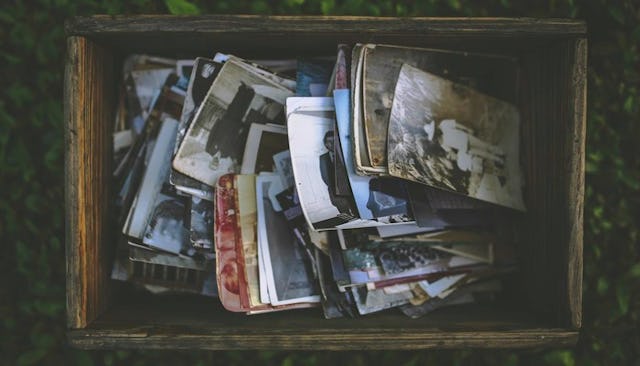Living Life After 9/11: How I Found Strength From My Grandpa's Advice

I was a mess after 9/11. We all were, really. Of course, those who lost loved ones and those who were in the trenches saving lives and witnessing the devastation felt the effects of the attack in a more life-altering way than most of us. But we were all changed on that day.
I was 23 years old, newly married, and working at an office next to Grand Central Station. To be in Manhattan on that day was like nothing I’d ever experienced. As soon as I heard that two planes had crashed into the World Trade Center, I leapt out of my seat at my desk and ran out of the building. No one knew what was happening yet, but I was already certain that it was a terror attack, and my fight-or-flight reflex was in full response mode.
I walked down Madison Avenue and saw the towers burning. As I headed downtown, I walked by people sobbing, covered in ash. When I finally made it home, I smelled the smoke wafting over the city skyline to Brooklyn. A few days later, photos of the missing were plastered to walls, crowding subway stations, as we all tried to get back to “normal.”
Getting back to “normal” took much longer for me to achieve than I had expected. I had always been prone to panic attacks; mine were in full throttle after 9/11. I was rattled, traumatized, and terrified for what might come next.
It truly felt like the world was on the brink of catastrophe, much like it does these days with the uptick of mass shootings, terror attacks, racial divides, and hate mongering. This year has been a shit show so far — one of the most violent and vile times I can remember in our recent history. I am feeling it, deeply, especially now that I’m a mother. I want to protect my children from it all. I don’t want this to be the world they will live in — I want a better future for them.
The stress of this is affecting me profoundly; it’s getting under my skin. I’ve been crying, losing sleep, and constantly on edge. It reminds me sometimes of how I felt after 9/11 — the hopelessness of it all, feeling as though the world is about to end.
But then I remember something my grandpa said to me soon after 9/11. He was 90 years old at the time and would die the following year. I was visiting him at his home; it was 6 p.m. and the news was on, just as it was every single night like clockwork. Photos and videos of the tragedy were playing, as they had been for days on an endless loop.
My breath was caught in my throat. Tears were in my eyes.
My grandpa, though hard of hearing and dealing with a touch of dementia, totally caught on to what was happening. He put his soft hand on my shoulder and said, “Wendy, you can’t let this tragedy interfere with your own life. Concentrate on your family, your friends, the things that matter to your heart.”
I hadn’t said a word, but he’d picked up on just how much the grief and terror had taken over my life. He gave me permission to move on, to stop internalizing everything to the point that I was having trouble functioning in my own life.
My grandpa was a child of the Great Depression. He’d spent his childhood living with his four siblings and parents in a two-room tenement apartment on the Lower East Side. He’d lost relatives in the Holocaust. He knew life could be cruel and unfair. He knew that even better than I did.
But after living his whole life — rising up out of poverty, getting an education, starting a family, and choosing a life of honesty and virtue — he knew what mattered most. At the end of it all, he saw the full spectrum of what it means to be a human in this world and what it means to survive.
You can’t let every single awful thing get you down. You just can’t.
I am trying the best I can to take his advice to heart. It’s not easy. This world feels so fractured lately, and it’s absolutely affecting me. I believe it’s my duty to witness it all, to absorb some of the pain of the world, and to do what I can to inject some positivity and light.
But I also know that I can’t do that if I don’t take care of myself, and that means setting certain boundaries. It means turning off the news if it gets too heavy, not opening up every upsetting news story that pops up on my Facebook feed.
Most of all, it means nurturing the good life that I have right before my eyes, the one I am eternally grateful for every day. My kids, my husband, my parents, my friends — that’s what matters most. That’s what I need to concentrate on.
I miss my grandparents every day. I wish I could ask them about what is happening in our world right now, to get their opinions on whether it’s as dire as I think it is. I want to just sit there with them, in their old living room, the 6 o’clock news blaring, with a bowl of my grandma’s homemade soup in my lap.
All I have now are the memories that I cling to while trying my best to remember to use the wisdom they gifted to me. I imagine what a better world this would be if everyone took my grandpa’s advice — if we all shut out the negativity, and instead took more time to honor the people in our lives who mean the most to us and choose to live a life defined by kindness, respect, and love.